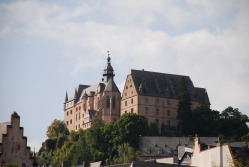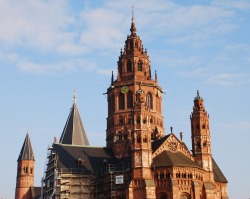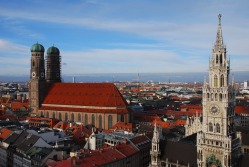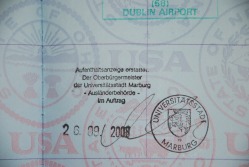So What did I do There?

I received a Fulbright Grant in the Student Category to work on projects related to the microbial ecology of methanotrophs at the Max-Planck Institute for Terrestrial Microbiology (hereafter MPI) in Marburg, Germany. Part of my research used culture-independent methods to determine the microbial composition of methanotrophs in grassland soil (sounds boring, but can be fun). That basically involved going into a field with colleagues, hammering a giant metal tube into the ground, taking the dirt out, and then extracting DNA and RNA from the dirt. Once you have the DNA, you can amplify certain gene sequences using magic (or PCR, whichever is faster), and then sequence these gene sequences. As these sequences are essentially unique to each bacterial species, you can then compare these sequences to those in an online database, and when you find a match, you know that that bacterial species is present. Sounds simple enough, but each of the steps are time-consuming and error-prone, so practice makes perfect!
My main project, however, involved checking for the presence of an isozyme (the sequence and structure is analogous to another enzyme, but the function is slightly different, usually in terms of substrate specificity or how much of the substrate it likes to have around) of particulate methane monooxygenase (pmmo) in methanotrophs. This enzyme catalyzes the oxidation of methane to methanol, but all you need to know is that lets methanotrophs eat methane. Excitingly, the new isozyme can use much lower concentrations of methane than the classical pmmo, and if it is commonly distributed in methanotrophs its presence could explain how they are able to survive at atmospheric methane concentrations, which is currently unknown. And since methanotrophs play a decisive role in the global methane cycle, helping to eliminate methane produced by other bacteria, this research could lead to new ways to help bring down the atmospheric methane concentration - and methane is a much more potent greenhouse gas than carbon dioxide.
In addition to the work in the lab, I took a few courses and got to know the culture of Germany a little bit better, as well as encountered a few frustations (try to cross a street before the cross walk sign is green, see what happens) and joys (a public transportation system that works! delicious food!).
Marburg an der Lahn

I lived and worked in the town of Marburg an der Lahn for most of the year. I arrived on Wednesday the 17th of September, and I stayed with a host family for three weeks. They live in a renovated factory (much nicer than it sounds) just across the river from the old town. Marburg was one of the few towns in Germany that escaped destruction during WWII, so it contains some of the few remaining examples of what "old Germany" used to look like. It was a poor town, since not much happened on or near the hill where it sits, so the residents had to build half-timbered houses because they couldn't afford to timber the whole house or make it out of stone. Ironically, these houses are now the most expensive and the most heavily touristed. It's a small town, with about three old churches, a university, and a castle that sits right on top of the hill (the one in the picture). Interestingly, it holds the distinction of being the only town in Germany to have an elevator from the lower part of the city to the Altstadt on the upper part of the hill. Sadly, it's not the only one in Europe - Luxembourg has one too.
The main cathedral (St. Elizabeth's, ironically protestant now) is the oldest example of a pure gothic cathedral in Germany, and used to be a fairly major pilgrimage site - not like Lourdes or anything, but in terms of Northern Europe in the top three, as St. Elizabeth died young and was a well-known healer with a romantic backstory. The church also has some really nice "Order Houses" around it - places where Germanic knightly orders would hang out, drink, and base themselves between destroying things (or so I like to imagine it, but it was more like spreading the word of god and other such prosaic things). Sadly, some were bulldozed in the 60's to make room for apartment complexes/new university buildings.
I worked at the Max-Planck Institute for Terrestrial Microbiology and my colleagues there were very nice and helpful. It's located about 15 minutes away from the city, near the departments of biology and medicine. After the outbreak of the Marburg virus here in 1962, everyone thought it best to move such things farther afield from the center of town. Very cool side note - I walked by a BSL4 lab everyday on my way to lunch - one of two in Germany! There are pictures of TEM micrographs of the Marburg virus on the exterior walls, and it's very artsy.
Mainz

Mainz was my second home for my stay in Germany, as Erica lived there. It's a nice old city, with a history going back to the Roman times, when it was known as Mogontiacum and served as the most important administrative site east of the Rhine. There are still some Roman ruins here, including a theater, a victory column, and a memorial for the Roman general Drusus. After the Romans left/were forced out, Mainz served as the most important seat of Roman Catholic power north of Italy - it is still allowed to refer to its Ecumenical Council as a "Holy See" and this history accounts for its wonderful cathedral, which is Romanesque - who says all of Germany has to be Gothic?
I keep finding weird connections between Marburg and Mainz (even though it's probably just the availability heuristic hard at work...). The two biggest examples are the Deutscher Sprachatlas, a research center focusing on German dialects founded in the early 20th Century, which is run as a joint enterprise between the University of Marburg and the University of Mainz. The other example is the project that I worked on, bacterial regulation and mediation of organic methane release. The first work on this project was done at the Max Planck Institute for Biochemistry in Mainz, where they put forward a theory in the late 1990's proposing that plants create methane and are a significant global contributor. This theory has since been proven false (just in these past few months, actually), but the work opened the door for bacterial regulation of methane, so thanks to them, I have a project here in Germany.
Munich

Due to the generosity of some relatives living in Munich, I guess this city could be considered my "third home" here, and I managed to visit three times. However, every day I've been there the weather has been perfect - it seems that Munich only knows sunny skies with light clouds while the rest of Germany suffers under a blanket of fog, clouds, snow, or rain. Founded by monks in the 1000's or 1100's, the city quickly became known for it's beer and when the Wittelsbach dynasty made it their seat of government, it became a cultural capitol. Known as "Germany's Secret Capitol" it boasts a number of museums, beer halls, and the friendliest (at least initially) Germans I've met so far. Combine these offerings with easy access to lakes and the Alps and it's not too surprising why so many Germans list it as the place they would most like to live.
The Visa Process

So while the cities and culture of Germany is/are wonderful and all, getting to the point where you can enjoy it is surprisingly non-trivial. The Germans invented bureaucracy (they claim to have stolen it from the US, but this is a bold, bold lie. Although we brought our system over here after the war for our administration, a number of "improvements" have been made since then) and the visa process is certainly no exception. So hopefully those of you going here (future Fulbrighters, mayhaps?) will find this moderately useful, while the rest of you can laugh at my expense.
It all started at the airport. When I went through immigration/passport control, they failed to stamp my passport. This was probably due to the fact that I had another visa from two years ago (clearly expired, but the man was not taking any time to read it), so the immigration controller (policeman?) just waved me through. I tried to explain this mistake to him, naturally in German, but this came out as more of a Mfhafhad, and he nodded, said, "No no OK" and sent me on. Your German is never as good as you think it is when you just stepped off a plane with no sleep and haven't bothered to use it for three months. Normally not having a stamp is no problem thanks to the Schengen Agreement and all, so I was not too concerned. This would come back to haunt me.
After this joy at the airport I spent a fitful afternoon/evening/night/early morning trying to sleep/not oversleep (jet lag is the worst!) and make it to my train to the Fulrbight orientation in Goettingen, where they tell us one of two things: 1. Things we already knew and which were common sense, in great detail (It is polite to greet people). and 2. Things we did not know, and which would be vital, in much less detail (You will need a bank account. Banks are common. You will need to register with the Police in the future). Naturally I also forgot most of these things, as I went straight to the host family. At the host family, my German improved, but I forgot that "register soon" in Germany mean "you should have done this yesterday" in the rest of the world (by that I mean America). So by the time I got around to checking on how to register at the University of Marburg, I noticed a little warning: "Please register at the Police and with the Stadtbuero (exact translation unimportant, headquarters of the beauracracy suffices) within ONE week. Failure to do so can result in deportation/failure to grant a residence permit." Now the paranoia kicks into overdrive, so I print out all my forms and show up at the Stadtbuero the next day, thinking OK, I'm a bit late, but it can't be that bad. Wrong.
This is where the lack of a stamp proved to be fun/traumatic. Since I had no passport stamp, I could not prove which date I entered the country, resulting in me going back home (one hour each way with waiting times!) to get my ticket stub. The airline was called, my seat confirmed, and, finally, one stamp was given to me, the treasuerd stamp you see in the photo caption. With this stamp I could now register with the police. After registering with the police, I was given another set of forms to fill out in great detail, including my parent's names and birthdates (not even kidding). In addition to this form, I then had to gather proof of my university matriculation, proof of bank account, proof of income, proof of permission to work at the MPI Marburg, and proof of registration with the police/rental contract. That was all easy to pick up and just required sitting through a university orientation. So I can finally go back and get my visa, which they granted to me. So, in conclusion, be more organized than me and have all your papers. Do it on time and it should be painless.

Somewhere Else by Somewhere Else is licensed under a Creative Commons Attribution-Noncommercial-No Derivative Works 3.0 United States License.
